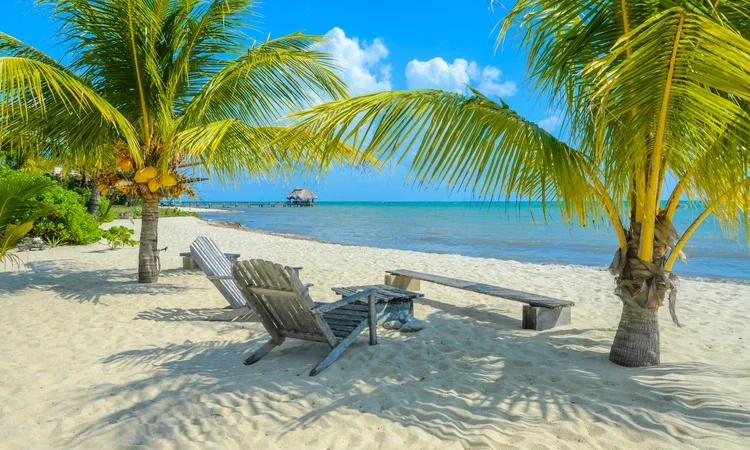
What I Found At “Pleasant Point”
Driving down the peninsula on smooth roads baked by the tropical sun, it suddenly struck me that I hadn’t been to Placencia in southern Belize in nearly 10 years.
As I came closer to the end of my journey, there I was, stunned by what I found.
High-quality developments, great restaurants, a friendly atmosphere that surpasses that of the general good nature of the rest of the country.
How could I have been missing all this?
Placencia is a 17-mile sand spit that is at most only a quarter-mile wide. The one-time fishing village turned tourist destination boasts high-quality developments, high-quality people, and little to no crime… just an abundance of deserted white beaches, turquoise waters, and relaxed luxury.
Tourism and quietly opulent living seem to have adopted Placencia for several reasons, one of which is its barrier reef.
This coral wonderland is made of billions of individual living coral polyps and is home to some of the most diverse communities of marine species anywhere in the world.
The reef also protects Placencia from Atlantic storms and provides clear blue water between the mainland and the reef.
A Bit Of Background…
When Spanish explorers came to the area hundreds of years ago, they saw pristine beaches lined with coconut palms. They named the peninsula Punta Placencia (“pleasant point” in English).
This description is equally suitable today.
Pirates holed up on the peninsula in 1629, using the shallow cuts through the barrier reef (the second largest in the world) to shelter from the Spanish and English navies’ reprisals for harrying their merchant ships.
In pre-Columbian times, there were more than 14 Maya settlements dotting the area around the peninsula, where the natives fished, traded, and produced salt for export across the Mayan world.
Today, Latino, Mestizo, Creole, Garifuna, Mennonite, East Indian, and Chinese people, plus gringos, spice up what was once a monocultural community.
The Communities Of The Peninsula
“Placencia,” as it’s referred to today, is understood by most to mean the entire peninsula, which encompasses the villages of Riversdale, Maya Beach, Seine Bight, and Placencia Village.
Riversdale is a small village at the top of the peninsula and is mostly populated by local agricultural workers and fishermen. Maya Beach is south of Riversdale and is becoming a new destination, with expats moving there in greater numbers.
A general store and restaurant have made this village a desirable place to live. Quality developments exist in this area, making this a spot to consider for your best real estate options.
Seine Bight is a Garifuna village that was traditionally a fishing village, with the local workers now moving into the tourism sector. It’s not considered an attractive location in comparison to Maya Beach or Placencia Village.
Placencia Village is the largest of the villages and the focus of the most activity and festivals.
Go Offshore Today
Sign up to our free twice a week dispatch Offshore Living Letter
and immediately receive our FREE research report
on how to live tax-free today, while earning up to $215,200!
There are many foreign-owned businesses on the peninsula, both large and small. In fact, most of the profits earned are from foreign investments.
Opportunities for real estate investment, small-scale development, and other service or supply opportunities still exist and will become more evident as the community grows.
The expat community gets involved in charitable fundraisers such as those of the Placencia Humane Society and the Rotary Club. Good causes and various festivals and celebrations are often hosted with expat involvement.
Placencia is safe, laid-back, and easy to navigate. The locals and the expat community are extraordinarily harmonious in managing development in a responsible way.
Cost Of Living
The cost of living in Placencia is higher than in other places on the Belize mainland.
This doesn’t mean that life is exorbitantly expensive… Rent for a single unit can be as low as $500 per month.
Walking and cycling are both viable and free options for transportation to village destinations. Taxis can run $6 for the several-mile trip from Placencia Village to the airport.
Golf carts are quite reasonable to buy new ($6,000 and up) and cheap to use over short distances. Local buses get you to Dangriga, Belmopan, and anywhere else on the mainland.
For groceries, I recommend using Ming’s, as I found him exceptionally helpful and rightfully boastful of his great selection of imported foodstuffs and competitive prices.
Greg’s Fruit and Veg offers a variety of fresh produce and fruit, both in season and imported. Greg started traveling from Cayo to Placencia 21 years ago to supply the village, and now he and his wife offer prices close to the best available in Cayo’s largest market.
Many people go to the Fishermen’s Cooperative at the end of the main street—which is really a footpath—by the pier, or they buy directly from the fishermen as they clean their catch under the palm trees at the end of the peninsula.
Shop around. Prices vary greatly from one store to another…
What’s There To Do?
Placencia offers some of the best culinary options in all of Belize. From Indian and Italian to fresh fish and authentic local cuisine, there is a surprising amount on offer for such an intimate location.
There are dozens of restaurants, bars, spas, and other facilities available to visitors or residents, with each resort having its own unique facilities and amenities.
There are great diving and snorkeling destinations not far from Placencia. Go reef snorkeling at Lighthouse Caye, Ranguana Caye, or Pompion Caye, where you can enjoy a 45-minute boat ride to some of the most spectacular cayes on the reef.
Travel by boat to the village of Monkey River, cruise up the rain forest-lined river, and see the abundant wildlife, including iguanas, crocodiles, birds, and howler monkeys. Keep an eye out for dolphins and manatees.
Getting Here
Once you touch down at Philip Goldson International Airport, you can catch one of the two domestic airlines to Placencia.
The two domestic airlines are Tropic Air and Maya Island Air. Maya Island Air charges $270 for a return flight from the international airport, with several flights per day.
Placencia Municipal Airstrip is several miles from Placencia Village, and a taxi costs $6.
It’s a three-hour drive from the international airport to Placencia Village. Parts of the drive are on the Hummingbird Highway and pass some of the most beautiful areas of Belize.
Is Placencia Right For You?
Don’t come to Placencia if:
· You want Cancún-style traffic, mega-developments, and nightlife—or really any kind of nightlife.
· You’re agoraphobic (it’s exceptionally nice outside).
· You expect things to get done the instant you think of them, or you expect the local culture to march to your tune.
Do come to Placencia if:
· You love Caribbean island luxury on the mainland.
· You like relaxed, friendly communities.
· You like buying on the Path of Progress.
· You want to open a business.
· You like blue waters, luxury spas, and low crime rates.
· You want to experience paradise.
Sincerely,
Con Murphy
Contributor, In Focus: Belize




